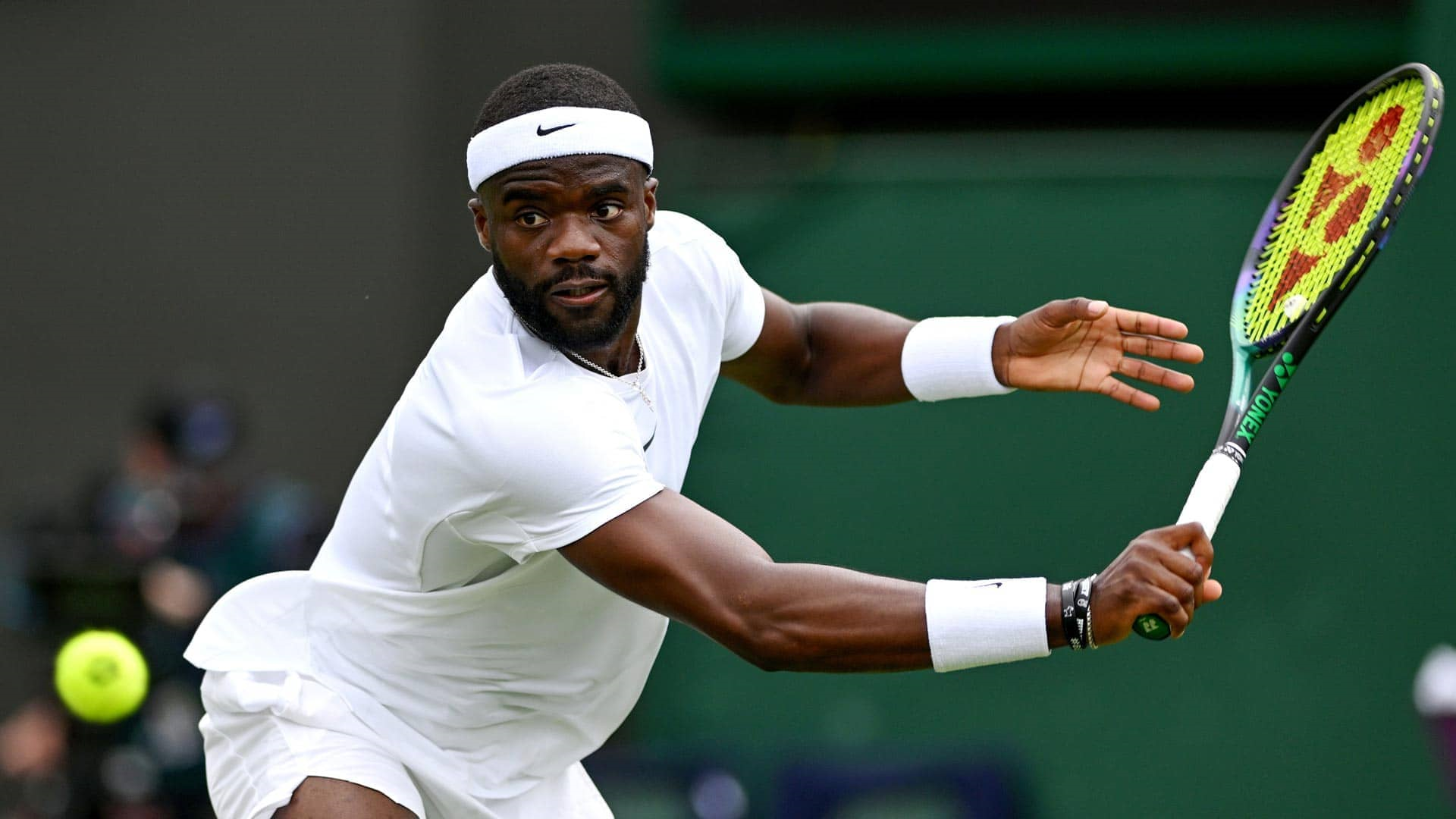The second round of Wimbledon 2025 proved to be a challenging hurdle for several prominent American male tennis players. In a day marked by significant upsets, the hopes of the US contingent took a considerable hit.
Among the most notable exits was Frances Tiafoe, the tournament’s No. 12 seed. He joined a growing list of seeded players who unexpectedly departed the prestigious All England Club. Tiafoe was eliminated by Cameron Norrie, a familiar name who reached the semifinals in 2022. The match concluded with a score of 4-6, 6-4, 6-3, 7-5, showcasing Norrie’s resilience and strategic play.
This early departure continues a concerning trend for Tiafoe in recent Grand Slams. Since the beginning of 2024, across seven major tournaments, Tiafoe has now faced elimination in the second round on four separate occasions. Wimbledon, in particular, has proven to be a persistent challenge for him. It stands as the “only major he has not made at least the quarterfinals.” In the past four years, his journey at Wimbledon has consistently ended in either the third or fourth round.
The last time Tiafoe exited the All England Club before the third round was back in 2019, when he suffered an opening-match defeat. This recurring pattern suggests a particular struggle for Tiafoe to find his rhythm and advance deep into the Wimbledon draw.
Tiafoe’s Battle on Court 1: A Shifting Momentum
Frances Tiafoe’s second-round encounter against Cameron Norrie on Court 1 began promisingly, but quickly turned into a test of endurance and shifting momentum. Tiafoe initially appeared to be in control, securing the opening set with a single break of serve. This strong start suggested he might build on his seeded status and advance comfortably. However, the dynamics of the match underwent a dramatic transformation towards the end of the second set.
Cameron Norrie, who notably “had never previously beaten a top-20 player at Wimbledon,” found a surge of energy and began to assert his dominance. He started dictating points with greater consistency and aggression. Conversely, Tiafoe’s performance began to fade, his initial momentum seemingly dissipating. This shift in momentum was critical. Norrie’s newfound confidence, combined with Tiafoe’s visible struggles, set the tone for the remainder of the match. The British crowd, undoubtedly behind their home player, sensed the change and added to the pressure on Tiafoe.
During a critical juncture before the start of the fourth set, Tiafoe took a seven-minute bathroom break, stepping off the court in an attempt to regroup. Such breaks are common in tennis but can sometimes disrupt an opponent’s rhythm. However, Norrie remained unfazed by the interruption. He was “not put off his stride” and maintained his focus. Upon resumption of play, Norrie immediately capitalized, securing a crucial break of serve to take a 4-3 lead in the fourth set.
Although Tiafoe showed signs of fight and “managed to respond” to Norrie’s surge, reclaiming a break of his own to level the score, Norrie remained “relentless.” He continued to press Tiafoe’s serve, ultimately pouncing on another opportunity. Norrie secured the decisive break once more, allowing him to “close out the match” and claim a significant victory over the higher-ranked American. This match highlighted Norrie’s mental fortitude and ability to maintain focus under pressure, while also exposing some vulnerabilities in Tiafoe’s game.
Youthful Brilliance: Fonseca’s Breakthrough Performance
Beyond Tiafoe’s exit, the second round also saw another American fall, albeit to a rising star making a significant mark. Jenson Brooksby, another American male player, was defeated in his second-round match. He lost to Brazilian 18-year-old Joao Fonseca with a score of 6-4, 5-7, 6-2, 6-4. Fonseca is a particularly notable figure in the draw this week, as he is the “youngest man in the field at the All England Club.” His victory over Brooksby is a testament to his burgeoning talent and composure beyond his years.
Fonseca’s achievement is quite remarkable historically. With this win, he officially became the “youngest man to reach the third round of Wimbledon since Bernard Tomic in 2011.” This places him among a select group of prodigious talents who have made an early impact at one of tennis’s most prestigious tournaments. Furthermore, his advancement marks another significant milestone for Brazilian tennis. He is only the “second Brazilian man to advance that far in the past 20 years,” with the only other instance being Thomaz Bellucci in 2010. These statistics underscore the rarity and significance of Fonseca’s performance.
Speaking about his achievement, a visibly proud Fonseca commented, “It’s something to be proud of, for sure.” He acknowledged his rapid adaptation to the grass surface, which is often considered the most challenging for young players. Fonseca specifically highlighted his development on this unique surface, stating, “I’m very happy the way that I’ve developed on this surface, I’m evolving. So I’m happy with it.”
This sentiment reflects a maturity and dedication to improving his game, even on unfamiliar territory. Notably, Wimbledon is only Fonseca’s “fourth tour-level event on grass,” making his progress even more impressive. His ability to adapt quickly and compete effectively on a surface where experience often dictates success points to a bright future for the young Brazilian.
More American Losses and a South American Showdown
The challenging day for American men at Wimbledon continued with additional losses, setting the stage for an intriguing third-round match. Chilean qualifier Nicolas Jarry delivered a dominant performance, ousting American Learner Tien in straight sets: 6-2, 6-2, 6-3. Jarry’s victory adds to a noteworthy trend for Chilean men’s tennis at Wimbledon.
This marks the “fifth straight year a Chilean man has reached the third round at Wimbledon.” This consistent presence is particularly significant given that it only happened once in the entire decade from 2010 to 2019, highlighting a recent resurgence for Chilean players at the All England Club.
With their respective second-round victories, Joao Fonseca and Nicolas Jarry are now set to face each other in the next round. This upcoming match holds historical significance for South American tennis. In the Open era, there have been “only two previous occasions when two South American men played each other in the third round or later” at Wimbledon. Both of these rare occurrences happened back in 2002. This upcoming encounter between Fonseca and Jarry will add a new chapter to this limited history, guaranteeing a South American presence in the fourth round.
Looking ahead to their match, Fonseca anticipates a lively atmosphere. He noted the passionate fan bases for both countries: “I know Chile fans, they’re loud. Yeah, the Brazilians are loud too. It’s going to be nice.” Beyond the crowd’s energy, Fonseca also offered insights into Jarry’s game, showing respect for his opponent’s abilities on grass. He remarked, “Nico is a nice person and also a nice player. He has a very good serve. He’s playing good on grass.” This respectful assessment suggests a competitive but sportsmanlike encounter between the two South American talents.
The woes for American men on Wednesday concluded with another defeat. Ethan Quinn became the “fourth American man to fall” during the day’s play. He was handed a straight-sets defeat by Poland’s Kamil Majchrzak, further reducing the American presence in the men’s singles draw.
Remaining American Hopes: Nakashima Advances, Head-to-Head Looms
While many American men faced early exits, some have managed to navigate the challenging initial rounds, keeping US hopes alive in the Wimbledon men’s singles draw. Brandon Nakashima, the 29th seed, successfully concluded his first-round match against Yunchaokete Bu. Their match, which had been suspended on Tuesday due to darkness, resumed and saw Nakashima emerge victorious with a score of 6-4, 4-6, 7-6 (1), 6-4. This win officially completed all first-round matches in the men’s singles draw.
Looking ahead to Thursday’s schedule, there are “five American men playing in the top half of the draw.” This cluster means that at least one American is guaranteed to advance from a particular section, as the draw includes a direct “head-to-head matchup between Nakashima and Reilly Opelka.” This pairing ensures that one American will progress to the third round, regardless of the outcome. These remaining players carry the torch for American men’s tennis as the tournament progresses. Their performances will be closely watched by fans hoping for a deeper run from the US contingent at this year’s Wimbledon Championships. The journey continues for these players, aiming to defy the trend of early exits seen on Wednesday.
The All England Club: Where Dreams and Challenges Collide
Wimbledon, hosted at the prestigious All England Lawn Tennis and Croquet Club, is arguably the most traditional and revered of the four Grand Slams. Its unique grass courts present a distinct challenge that often reshapes players’ strategies and outcomes. The surface itself plays a significant role in the early exits seen from some American players. Grass demands a different style of play compared to the hard courts and clay courts prevalent on the tour.
Players with powerful serves and flat groundstrokes often thrive on grass, as the low bounce and quick pace reward aggressive play. Movement on grass is also unique; it can be slippery, requiring exceptional balance and footwork. Many American players grow up primarily playing on hard courts, making the transition to grass a steeper learning curve. This might explain why some, despite high rankings, struggle to adapt quickly enough in the early rounds.
The atmosphere at the All England Club also contributes to the unique pressure of Wimbledon. The strict dress code, the royal patronage, and the respectful yet incredibly enthusiastic crowd all add to the tournament’s mystique. For younger players like Joao Fonseca, adapting to both the surface and the grand stage is a testament to their mental fortitude.
For seasoned players like Frances Tiafoe, the consistent struggle at Wimbledon highlights the nuanced demands of the tournament, where even a top-ranked player can find themselves battling against both their opponent and the very nature of the grass court itself. Every year, Wimbledon offers a blend of expected triumphs and surprising upsets, reinforcing its reputation as a true test of a tennis player’s all-around game and resilience.








